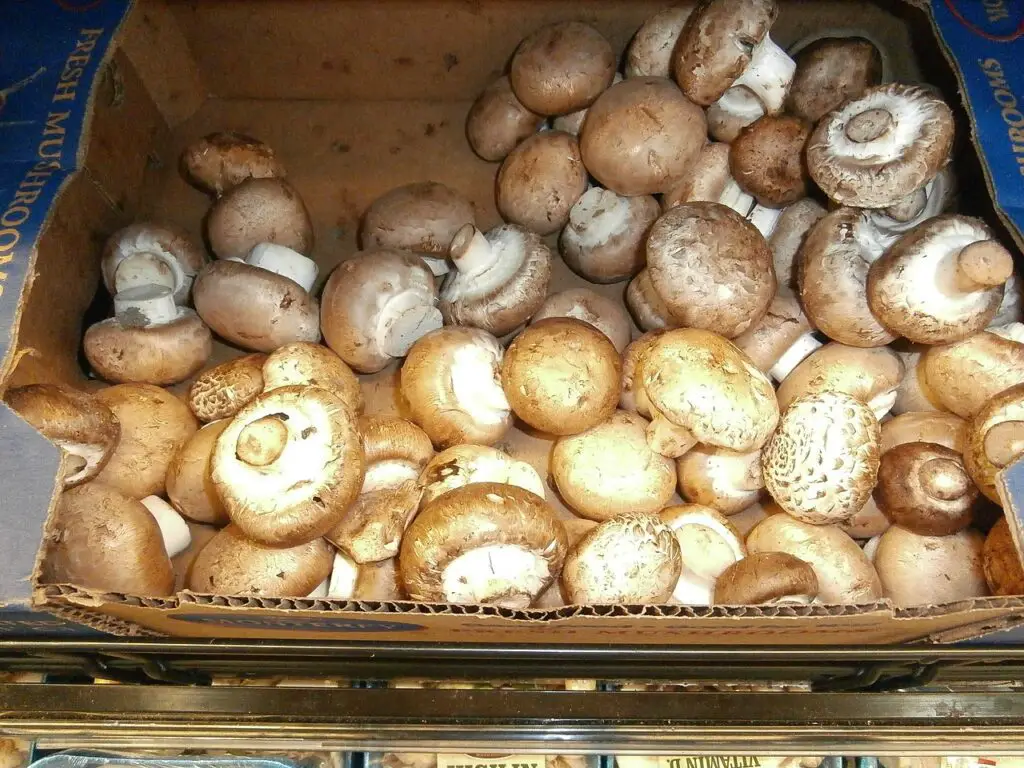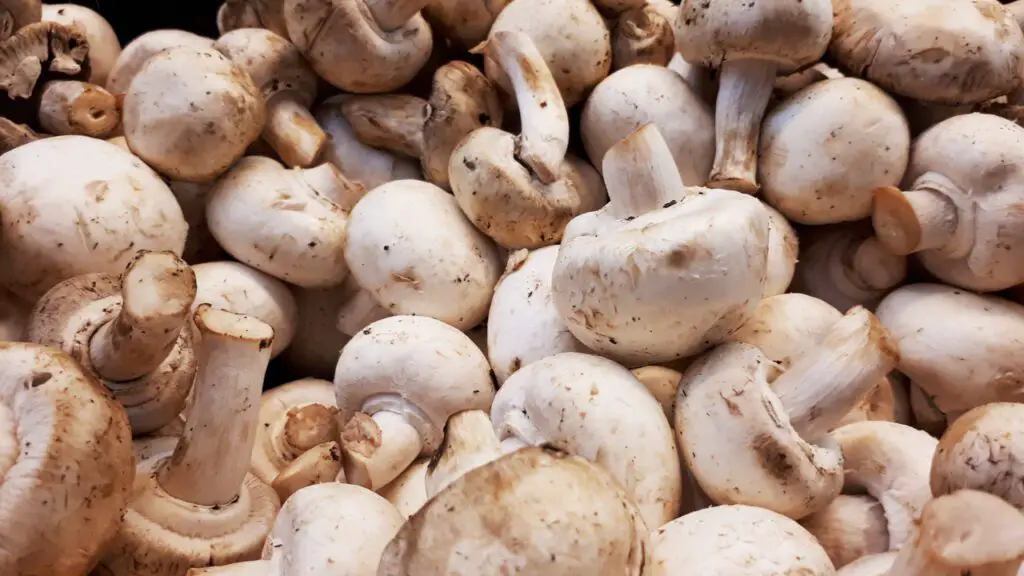As a dog owner, it’s important to be mindful of what your furry friend is consuming.
While mushrooms are a healthy addition to our diets, it’s important to ask the question: can dogs eat store-bought mushrooms?
Mushrooms can be a nutritious treat for dogs, but not all mushrooms are created equal.
In this article, we will explore the benefits and risks of feeding store-bought mushrooms to your dog, and provide some guidelines to help you make an informed decision.
- Can Dogs Eat Store-Bought Mushrooms?
- List of Safe Store-Bought Mushrooms For Dogs
- How Much Store-Bought Mushrooms Can Dogs Eat?
- How Often Can Dogs Eat Store-Bought Mushrooms
- Health Benefits of Store-Bought Mushrooms To Dogs
- Potential Risks of Feeding Store-Bought Mushrooms To Dogs
- Nutritional Benefits of Store-Bought Mushrooms For Dogs
- Are Dogs Sensitive To Store-Bought Mushrooms?
- How To Prepare Store-Bought Mushrooms For Dogs
- How Fast Will Dogs Digest Store-Bought Mushrooms
- In Conclusion
Can Dogs Eat Store-Bought Mushrooms?

Yes, dogs can eat store-bought mushrooms such as portobello, white button, cremini, shiitake, oyster, enoki, maitake, king oyster, and morel mushrooms.
However, it is important to make sure that the mushrooms have been cooked and are free of any seasonings or additives that could be harmful to your pup.
Wild mushrooms can be toxic to both humans and dogs, so it is best to avoid them altogether. If you ever suspect that your dog has eaten a wild mushroom, contact your veterinarian immediately.
Overall, store-bought mushrooms can be a great addition to your pup’s diet in moderation. They are packed with vitamins and minerals such as Vitamin D, potassium, iron, and selenium which can help support a healthy immune system.
If you decide to give your pup some store-bought mushrooms, make sure they are cooked properly and free of any seasonings or additives before serving them up!
See also: 47 Safe Vegetables To Feed Your Dog. Puppy Power!
List of Safe Store-Bought Mushrooms For Dogs

Portobello Mushrooms
Portobello mushrooms are a great source of nutrients such as potassium, copper, and iron, and are easy to digest for dogs. They are best served cooked and cut into small pieces as a healthy treat.
Shiitake Mushrooms
Shiitake mushrooms are rich in B vitamins, copper, and selenium and have anti-cancer and immune-boosting properties. These mushrooms should always be served cooked to help with digestion.
Button Mushrooms
Button mushrooms are a good source of antioxidants and adaptogenic compounds. These mushrooms can be served cooked and are great as an occasional treat.
Oyster Mushrooms
Oyster mushrooms contain iron, fiber, and B vitamins that are essential for your dog’s health. They are easy to digest and can be served cooked as a healthy addition to your dog’s diet.
Crimini Mushrooms
Crimini mushrooms are similar to Button mushrooms in appearance and flavor. They are rich in Vitamin B12, zinc, and copper and can be served to your dog cooked as an occasional treat.
Enoki Mushrooms
Enoki mushrooms have low calories and high nutrients such as Vitamin D, potassium, and calcium. These mushrooms can be served to your dog cooked and chopped into small pieces.
Morel Mushrooms
Morel mushrooms are packed with nutrients such as protein, Vitamin D, and fiber that support overall health. They should only be served to your dog cooked and in small amounts.
Reishi Mushrooms
Reishi mushrooms have anti-inflammatory and immune-boosting properties that make them a great addition to your dog’s diet. These mushrooms should only be served cooked and in small amounts.
Porcini Mushrooms
Porcini mushrooms are rich in minerals such as iron, magnesium, and potassium. They should only be served to your dog cooked and in moderation as an occasional treat.
How Much Store-Bought Mushrooms Can Dogs Eat?
When it comes to serving size, it’s important to be mindful of your dog’s weight and size. As a general rule, dogs should not be given more than 10% of their daily caloric intake as treats.
Smaller dogs can have up to one ounce of store-bought mushrooms, while larger dogs can have up to three ounces.
If you decide to feed your dog some store-bought mushrooms, it is important to keep in mind that they should only be given in moderation. Moderation means that mushrooms should not be a regular part of your dog’s diet, and should only be given as an occasional treat.
It’s also important to remember that mushrooms should not replace your dog’s regular diet or be used as a primary source of nutrition. Always make sure that your dog has a balanced diet that meets all of its nutritional needs.
In conclusion, while store-bought mushrooms can be a healthy treat for dogs, they should only be given in moderation and should not replace their regular diet. As always, it’s important to consult with your vet before introducing any new foods or treats to your pup’s diet.
Store-Bought Mushrooms Feeding Chart According To Size
| Food | Size | Portion |
|---|---|---|
| Store-Bought Mushrooms | Toy dogs | 1 ounce |
| Store-Bought Mushrooms | Small dogs | 1 ounce |
| Store-Bought Mushrooms | Medium dogs | 1-2 ounces |
| Store-Bought Mushrooms | Large Dogs | up to 3 ounces |
Store-Bought Mushrooms Feeding Chart According To Age
| Food | Age | Portion |
|---|---|---|
| Store-Bought Mushrooms | 0 – 6 months | Don’t feed |
| Store-Bought Mushrooms | 6 – 12 months | 1 ounce |
| Store-Bought Mushrooms | 12 – 24 months | 1-2 ounces |
| Store-Bought Mushrooms | 24+ months | up to 3 ounces |
How Often Can Dogs Eat Store-Bought Mushrooms
Dogs should only eat store-bought mushrooms occasionally, three times a week. It is recommended that mushrooms should not be a regular part of their diet.
Mushrooms should only be given as an occasional treat and not exceed more than 10% of their daily caloric intake.
As always, consult with your veterinarian before introducing any new foods or treats to your dog’s diet.
Health Benefits of Store-Bought Mushrooms To Dogs
- Boost Immune System. Store-bought mushrooms are high in antioxidants and beta-glucans, which are beneficial for the immune system. Antioxidants fight free radicals that can cause cell damage, while beta-glucans enhance the immune system’s response to infections.
- Promote Healthy Digestion. Store-bought mushrooms are a great source of dietary fiber, which can promote healthy digestion and bowel movements in dogs. They also contain prebiotics that supports the growth of good bacteria in the gut, which is essential for overall digestive health.
- Encourage Strong Bones. Store-bought mushrooms contain Vitamin D, which helps dogs absorb calcium and phosphorus more efficiently, promoting healthy bone growth and preventing conditions like osteoporosis.
- Provide a Source of Energy and Nutrients. The potassium, copper, and iron found in mushrooms are great sources of essential nutrients for dogs. Additionally, the B vitamins in mushrooms help the body convert food into energy, which is essential for overall health and wellness.
- May Help Lower the Risk of Cancer. Some studies have suggested that mushrooms may have anti-cancer properties. Specifically, mushrooms like shiitake, maitake, and reishi have been shown to contain compounds with immune-boosting and anti-cancer properties.
Potential Risks of Feeding Store-Bought Mushrooms To Dogs
- Toxicity. While most store-bought mushrooms are safe for dogs, some wild mushrooms contain toxins that can be deadly if ingested. It can be difficult to distinguish between safe and toxic mushrooms, so it’s best to avoid them altogether. If you suspect your dog has ingested a toxic mushroom, seek veterinary care immediately.
- Digestive Upset. Mushrooms can be difficult for some dogs to digest and can cause stomach upset, including vomiting and diarrhea. This is especially true for dogs with sensitive stomachs or those that have never had mushrooms before.
- Allergic Reactions. Dogs, like humans, can develop allergies to certain foods, including mushrooms. If your dog has never had mushrooms before, start with a small amount to see if they have any adverse reactions, such as itching, swelling, or difficulty breathing.
- Interference with Medications. Mushrooms, like many other foods, can interfere with certain medications that your dog may be taking. Talk to your veterinarian to determine if mushrooms are safe to give alongside any medications your dog is currently taking.
- Choking Hazard. Mushrooms can be chewy and sometimes difficult for dogs to safely swallow, especially if they are not chopped into small, bite-sized pieces. Choking can be dangerous and even deadly for dogs, so it’s essential to be mindful of the size and texture of the mushrooms you give them.
Nutritional Benefits of Store-Bought Mushrooms For Dogs
| Mushrooms Nutrition Facts per 100 grams | % DV * |
|---|---|
| Calories | 22 |
| Total Fat | 0.3 g |
| Cholesterol | 0 mg |
| Sugar | 2 g |
| Glycemic Index | 15 |
| Sodium | 5 mg |
| Carbs | 3.3 g |
| Protein | 3.1 g |
| Vitamin D | 1 % |
| Calcium | 0 % |
| Iron | 2% |
| Potassium | 318 mg |
Are Dogs Sensitive To Store-Bought Mushrooms?
Yes, some dogs can be sensitive to store-bought mushrooms. Mushrooms are generally safe for dogs in small amounts, some dogs may experience digestive upset or allergic reactions when eating them.
Symptoms of sensitivity can include vomiting, diarrhea, stomach pain or discomfort, and in severe cases difficulty breathing, swelling, and hives.
These symptoms may occur immediately after eating mushrooms, or they may develop gradually over time as the dog’s system tries to digest the mushrooms.
If you notice any of these symptoms after giving your dog store-bought mushrooms, it’s best to stop feeding them to your dog and consult with your veterinarian.
Your vet may recommend a change in diet or run tests to determine if there are any underlying health issues causing the sensitivity.
How To Prepare Store-Bought Mushrooms For Dogs
Cook Mushrooms Thoroughly
Raw mushrooms can be difficult for dogs to digest, so it’s important to cook them before serving them to your pup. Grilling, sautéing, or baking mushrooms are all great ways to prepare them for your dog to eat. Just be sure to avoid using any seasonings, spices, or oils that may be harmful to your dog.
Chop Mushrooms Into Small Pieces
When giving mushrooms to your dog, it’s important to chop them into small, bite-sized pieces to reduce the risk of choking or any digestive issues that may arise from eating large pieces.
Incorporate Mushrooms Into Your Dog’s Meal
Another way to prepare mushrooms for your dog is to incorporate them into their regular meals. You can mix chopped mushrooms into their wet or dry dog food or incorporate them into homemade dog treats or snacks.
How Fast Will Dogs Digest Store-Bought Mushrooms
The speed at which dogs digest store-bought mushrooms can vary depending on the size, age, and overall health of your dog.
On average, it takes 24 to 48 hours for dogs to digest store-bought mushrooms. However, this can vary depending on the number of mushrooms ingested, and how easily digestible they are.
While mushrooms can provide many health benefits, it is important not to overfeed your dog. As mentioned before, feeding your dog mushrooms in moderation is crucial to prevent any digestive issues.
If you notice any changes in your dog’s bowel movements, such as diarrhea, vomiting, or lack of appetite after giving them store-bought mushrooms, it is best to reduce their mushroom intake and contact your veterinarian for support.
In Conclusion
In conclusion, store-bought mushrooms can be a healthy and nutritious treat for dogs when prepared and served correctly.
However, it’s important to be cautious when feeding your dog mushrooms, as some species can be toxic and cause serious health issues.





Leave a Reply